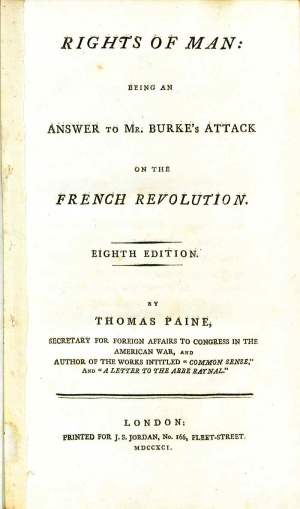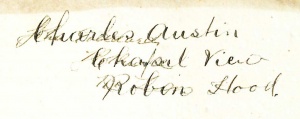Difference between revisions of "Rights of Man"
| Line 6: | Line 6: | ||
|link=https://catalog.swem.wm.edu/law/Record/3654154 | |link=https://catalog.swem.wm.edu/law/Record/3654154 | ||
|shorttitle=Rights of Man | |shorttitle=Rights of Man | ||
| − | |vol= | + | |vol=part one |
|author=Thomas Paine | |author=Thomas Paine | ||
|publoc=London | |publoc=London | ||
|publisher=Printed for J.S. Jordan | |publisher=Printed for J.S. Jordan | ||
| − | |year=1791- | + | |year=1791-1792 |
|edition=Eighth | |edition=Eighth | ||
|lang=English | |lang=English | ||
| − | |set=2 | + | |set=2 parts in 1 |
| − | |pages=x, 171 | + | |pages=x, 171 (part one); xv, 178 (part two). |
| − | |desc=22 cm. | + | |desc=8vo (22 cm.) |
}}[http://en.wikipedia.org/wiki/Thomas_paine Thomas Paine] (1737-1809) Revolutionary, author, pamphleteer. Thomas Paine had the ability to communicate the ideas of the [http://en.wikipedia.org/wiki/Age_of_revolution Age of Revolution] in plain English that could be understood by all. He is considered one of the most radical thinkers of the age.<ref>Erick Foner, [http://www.anb.org/articles/16/16-01251.html “Paine, Thomas”] in ''American National Biography Online'' (Oxford University Press, Feb. 2000- ), accessed Oct. 3, 2013.</ref> In ''The Rights of Man'', he defended the [http://en.wikipedia.org/wiki/French_Revolution French Revolution] against the attacks of [http://en.wikipedia.org/wiki/Edmund_Burke Edmund Burke]. This response repudiated the concept of “hereditary” governments found in monarchies.<ref>Mark Philip, [http://www.oxforddnb.com.proxy.wm.edu/view/article/21133 "Paine, Thomas (1737–1809)"] in ''Oxford Dictionary of National Biography'' (Oxford University Press, 2004- ), accessed Oct. 3, 2013.</ref> Because of his arguments against monarchy, Paine was charged with seditious libel causing him to flee England never to return.<ref>Ibid.</ref><br /> | }}[http://en.wikipedia.org/wiki/Thomas_paine Thomas Paine] (1737-1809) Revolutionary, author, pamphleteer. Thomas Paine had the ability to communicate the ideas of the [http://en.wikipedia.org/wiki/Age_of_revolution Age of Revolution] in plain English that could be understood by all. He is considered one of the most radical thinkers of the age.<ref>Erick Foner, [http://www.anb.org/articles/16/16-01251.html “Paine, Thomas”] in ''American National Biography Online'' (Oxford University Press, Feb. 2000- ), accessed Oct. 3, 2013.</ref> In ''The Rights of Man'', he defended the [http://en.wikipedia.org/wiki/French_Revolution French Revolution] against the attacks of [http://en.wikipedia.org/wiki/Edmund_Burke Edmund Burke]. This response repudiated the concept of “hereditary” governments found in monarchies.<ref>Mark Philip, [http://www.oxforddnb.com.proxy.wm.edu/view/article/21133 "Paine, Thomas (1737–1809)"] in ''Oxford Dictionary of National Biography'' (Oxford University Press, 2004- ), accessed Oct. 3, 2013.</ref> Because of his arguments against monarchy, Paine was charged with seditious libel causing him to flee England never to return.<ref>Ibid.</ref><br /> | ||
<br /> | <br /> | ||
| Line 21: | Line 21: | ||
<br /> | <br /> | ||
After the Revolution, Paine went back to England where he became acquainted with [http://en.wikipedia.org/wiki/Edmund_Burke Edmund Burke].<ref>Ibid.</ref> When Burke attacked the French Revolution in writing, Paine responded with ''The Rights of Man''.<ref>Ibid.</ref> As a result of his argument against Burke, he was charged with sedition and fled to France. During his time in France, he was imprisoned for speaking out against executing [http://en.wikipedia.org/wiki/Louis_XVI_of_France King Louis XVI].<ref>Ibid.</ref> While in prison he wrote ''The Age of Reason'' in which he argued against the church. He was released from prison with the help of [http://en.wikipedia.org/wiki/James_Monroe James Monroe] and returned to America.<ref>Ibid.</ref> He found that because of his ideas in ''The Age of Reason'' he was very unpopular in the United States. When he died on June 8, 1809 only a handful of people attended his funeral.<ref>Philip, "Paine Thomas."</ref> | After the Revolution, Paine went back to England where he became acquainted with [http://en.wikipedia.org/wiki/Edmund_Burke Edmund Burke].<ref>Ibid.</ref> When Burke attacked the French Revolution in writing, Paine responded with ''The Rights of Man''.<ref>Ibid.</ref> As a result of his argument against Burke, he was charged with sedition and fled to France. During his time in France, he was imprisoned for speaking out against executing [http://en.wikipedia.org/wiki/Louis_XVI_of_France King Louis XVI].<ref>Ibid.</ref> While in prison he wrote ''The Age of Reason'' in which he argued against the church. He was released from prison with the help of [http://en.wikipedia.org/wiki/James_Monroe James Monroe] and returned to America.<ref>Ibid.</ref> He found that because of his ideas in ''The Age of Reason'' he was very unpopular in the United States. When he died on June 8, 1809 only a handful of people attended his funeral.<ref>Philip, "Paine Thomas."</ref> | ||
| − | + | [[File:PaineRightsOfMan1791Inscription.jpg|left|thumb|300px|<center>Inscription, front pastedown.</center>]] | |
==Evidence for Inclusion in Wythe's Library== | ==Evidence for Inclusion in Wythe's Library== | ||
| − | + | In a [[Wythe to Thomas Jefferson, 15 June 1792|letter]] to [[Thomas Jefferson]] from June 1792, George Wythe wrote, "I thank you for the 'rights of man' which you sent to me."<ref>[http://hdl.loc.gov/loc.mss/mtj.mtjbib006303 George Wythe to Thomas Jefferson, June 15, 1792] in ''The Thomas Jefferson Papers, Series 1 General Correspondence 1651-1827'', (Washington DC: Library of Congress, 1974), images 715-18.</ref> Both the Brown Bibliography<ref>Bennie Brown, "The Library of George Wythe of Williamsburg and Richmond," (unpublished manuscript, May, 2012) Microsoft Word file. Earlier edition available at: https://digitalarchive.wm.edu/handle/10288/13433</ref> and [http://www.librarything.com/profile/GeorgeWythe George Wythe's Library]<ref>''LibraryThing'', s. v. [http://www.librarything.com/profile/GeorgeWythe "Member: George Wythe"], accessed on March 19, 2014.</ref> on LibraryThing include the first edition (1791) of Thomas Paine's ''Rights of Man: Being an Answer to Mr. Burke's Attack on the French Revolution''. Brown also lists the second edition (1792) of the sequel ''Rights of Man: Part the Second, Combining Principle and Practice''. Both parts of ''Rights of Man'' went through multiple editions within months of their initial publications and we do not have enough information to verify which edition(s) Wythe owned. The Wolf Law Library purchased a copy of the eighth editions of part one (1791) and part two (1792) bound together. | |
| + | |||
==Description of the Wolf Law Library's copy== | ==Description of the Wolf Law Library's copy== | ||
| − | Bound in early nineteenth century full tan diced calf | + | Bound in early nineteenth century full tan diced calf. Spine with raised bands, tooled ornaments, brown title label, and gilt lettering. Front pastedown includes the inscription "Charles Austin, Chapel View, Robin Hood" written over a previous inscription. Purchased from Paul Foster. |
View [https://catalog.swem.wm.edu/law/Record/3654154 part one] and [https://catalog.swem.wm.edu/law/Record/3739689 part two] in William & Mary's online catalog. | View [https://catalog.swem.wm.edu/law/Record/3654154 part one] and [https://catalog.swem.wm.edu/law/Record/3739689 part two] in William & Mary's online catalog. | ||
| − | |||
| − | |||
| − | + | ==References== | |
<references/> | <references/> | ||
Revision as of 11:15, 19 March 2014
by Thomas Paine
| Rights of Man | |
|
Title page from Rights of Man, part one, George Wythe Collection, Wolf Law Library, College of William & Mary. | |
| Author | Thomas Paine |
| Published | London: Printed for J.S. Jordan |
| Date | 1791-1792 |
| Edition | Eighth |
| Language | English |
| Volumes | 2 parts in 1 volume set |
| Pages | x, 171 (part one); xv, 178 (part two). |
| Desc. | 8vo (22 cm.) |
Thomas Paine (1737-1809) Revolutionary, author, pamphleteer. Thomas Paine had the ability to communicate the ideas of the Age of Revolution in plain English that could be understood by all. He is considered one of the most radical thinkers of the age.[1] In The Rights of Man, he defended the French Revolution against the attacks of Edmund Burke. This response repudiated the concept of “hereditary” governments found in monarchies.[2] Because of his arguments against monarchy, Paine was charged with seditious libel causing him to flee England never to return.[3]
Paine was born in Thetford, Norfolk, England.[4] He spent his youth in England and met with limited success in his various enterprises. At thirty-seven, on the recommendation of Benjamin Franklin, he moved to America where he found his true calling.[5] There he began working as a journalist and used his skill in writing and debate to support and promote the American Revolution. His pamphlet Common Sense “became one of the most successful and influential pamphlets in the history of political writing.”[6] It helped the colonists see independence as “both desirable and attainable.”[7]
After the Revolution, Paine went back to England where he became acquainted with Edmund Burke.[8] When Burke attacked the French Revolution in writing, Paine responded with The Rights of Man.[9] As a result of his argument against Burke, he was charged with sedition and fled to France. During his time in France, he was imprisoned for speaking out against executing King Louis XVI.[10] While in prison he wrote The Age of Reason in which he argued against the church. He was released from prison with the help of James Monroe and returned to America.[11] He found that because of his ideas in The Age of Reason he was very unpopular in the United States. When he died on June 8, 1809 only a handful of people attended his funeral.[12]
Evidence for Inclusion in Wythe's Library
In a letter to Thomas Jefferson from June 1792, George Wythe wrote, "I thank you for the 'rights of man' which you sent to me."[13] Both the Brown Bibliography[14] and George Wythe's Library[15] on LibraryThing include the first edition (1791) of Thomas Paine's Rights of Man: Being an Answer to Mr. Burke's Attack on the French Revolution. Brown also lists the second edition (1792) of the sequel Rights of Man: Part the Second, Combining Principle and Practice. Both parts of Rights of Man went through multiple editions within months of their initial publications and we do not have enough information to verify which edition(s) Wythe owned. The Wolf Law Library purchased a copy of the eighth editions of part one (1791) and part two (1792) bound together.
Description of the Wolf Law Library's copy
Bound in early nineteenth century full tan diced calf. Spine with raised bands, tooled ornaments, brown title label, and gilt lettering. Front pastedown includes the inscription "Charles Austin, Chapel View, Robin Hood" written over a previous inscription. Purchased from Paul Foster.
View part one and part two in William & Mary's online catalog.
References
- ↑ Erick Foner, “Paine, Thomas” in American National Biography Online (Oxford University Press, Feb. 2000- ), accessed Oct. 3, 2013.
- ↑ Mark Philip, "Paine, Thomas (1737–1809)" in Oxford Dictionary of National Biography (Oxford University Press, 2004- ), accessed Oct. 3, 2013.
- ↑ Ibid.
- ↑ Ibid.
- ↑ Foner, "Paine, Thomas."
- ↑ Ibid.
- ↑ Philip, "Paine Thomas."
- ↑ Ibid.
- ↑ Ibid.
- ↑ Ibid.
- ↑ Ibid.
- ↑ Philip, "Paine Thomas."
- ↑ George Wythe to Thomas Jefferson, June 15, 1792 in The Thomas Jefferson Papers, Series 1 General Correspondence 1651-1827, (Washington DC: Library of Congress, 1974), images 715-18.
- ↑ Bennie Brown, "The Library of George Wythe of Williamsburg and Richmond," (unpublished manuscript, May, 2012) Microsoft Word file. Earlier edition available at: https://digitalarchive.wm.edu/handle/10288/13433
- ↑ LibraryThing, s. v. "Member: George Wythe", accessed on March 19, 2014.

